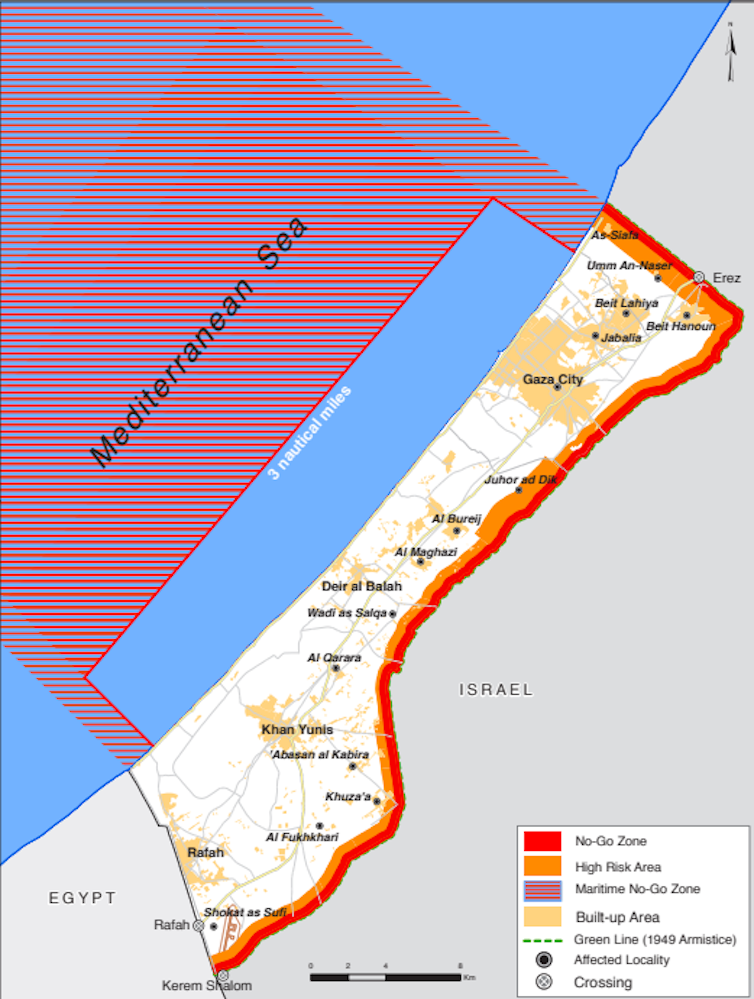Amid death and destruction, the latest conflict in Gaza highlights the depths of its humanitarian crisis
- Written by Amy Maguire, Associate Professor in Human Rights and International Law, University of Newcastle

Israel launched multiple air strikes on Gaza on August 5, in another eruption of open warfare between Israel and Palestinian militants. The latest attacks come just over a year after hundreds were killed in an intense period of conflict[1] in the territory.
Israel announced[2] its missile strikes were targeting military leaders of the al-Quds Brigades, the military wing of the Islamic Jihad militant organisation in Gaza. Israel alleged Islamic Jihad forces were making “threatening movements” near the Israeli border.
Israel’s strikes killed[3] two key leaders of Islamic Jihad in Gaza and severely damaged its military capabilities.
Palestinian Islamic Jihad responded by launching hundreds of rockets into Israel. The Israel Defence Forces reported[4] its Iron Dome missile defence system was operating at a 97% success rate in intercepting rockets launched from Gaza. No Israelis had been killed or seriously injured.
But the past three days of intense conflict have extracted a very heavy civilian toll in Gaza. The Palestinian Health Ministry reports at least 44 dead and over 350 civilians wounded. Reportedly among the dead were 15 Palestinian children[5], including five boys killed by a missile strike as they visited their grandfather’s grave.
An Egyptian-brokered ceasefire[6] between Israel and Islamic Jihad has now begun. It is too early to say whether the ceasefire will hold, or for how long.
The Palestinian governing authority in Gaza is Hamas[7], which was elected in 2006. Hamas does not recognise the legitimacy of the Israeli state and aims to liberate Palestine through armed resistance. Yet Hamas has not engaged[8] in the most recent outbreak of warfare.
Blockaded Gaza in humanitarian crisis
The Gaza Strip[9] is a 365-square-kilometre territory that has been under Israeli control since 1967, along with the other Palestinian territories of the West Bank and East Jerusalem. Over 2 million Palestinians live in the densely populated territory. Nearly 80%[10] depend on aid[11] to survive.
Gaza has been under blockade[12] for 15 years. Israel controls its airspace and territorial waters, along with two of three border crossings (Egypt controls the third). Gaza is often referred to as “the world’s largest open-air prison”.
References
- ^ intense period of conflict (www.bbc.com)
- ^ announced (www.washingtonpost.com)
- ^ killed (www.nytimes.com)
- ^ reported (www.timesofisrael.com)
- ^ 15 Palestinian children (www.middleeasteye.net)
- ^ ceasefire (www.aljazeera.com)
- ^ Hamas (www.cfr.org)
- ^ not engaged (apnews.com)
- ^ Gaza Strip (www.aljazeera.com)
- ^ Nearly 80% (www.unicef.org)
- ^ aid (reliefweb.int)
- ^ under blockade (www.un.org)
- ^ refugees (www.unrwa.org)
- ^ refugee camps (www.un.org)
- ^ highest population densities (www.unrwa.org)
- ^ undrinkable (www.trtworld.com)
- ^ electricity supply (www.ochaopt.org)
- ^ healthcare (www.map.org.uk)
- ^ power (www.nytimes.com)
- ^ permission to leave (www.ochaopt.org)
- ^ unemployment rate (reliefweb.int)
- ^ report (reliefweb.int)
- ^ their homes (www.reuters.com)
- ^ illegal and irresponsible (www.aljazeera.com)
- ^ apartheid (www.ohchr.org)
- ^ status quo (www.nytimes.com)
- ^ perpetual conflict (www.usip.org)

















